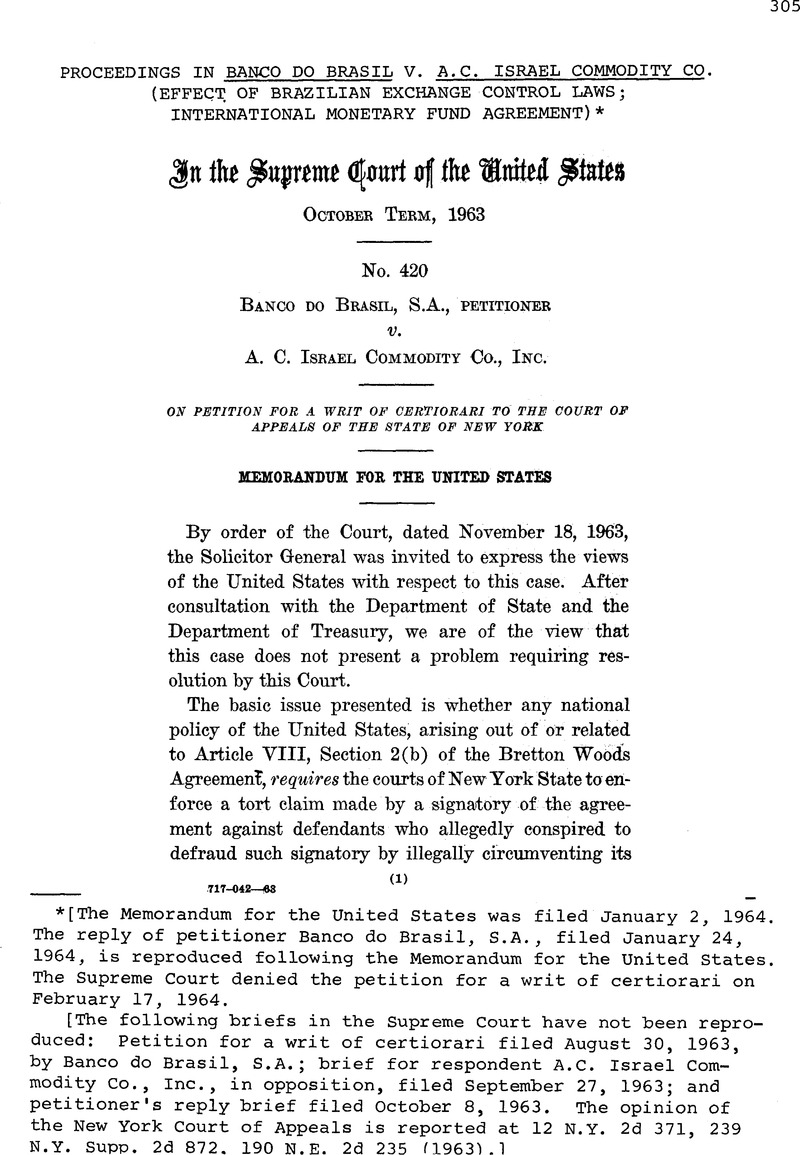No CrossRef data available.
Article contents
Proceedings in Banco Do Brasil v. A.C. Israel Commodity Co. (Effect of Brazilian Exchange Control Laws; International Monetary Fund Agreement)*
Published online by Cambridge University Press: 20 March 2017
Abstract

- Type
- Judicial and Similar Proceedings
- Information
- Copyright
- Copyright © American Society of International Law 1964
Footnotes
[The Memorandum for the United States was filed January 2, 1964. The reply of petitioner Banco do Brasil, S.A., filed January 24, 1964, is reproduced following the Memorandum for the United States. The Supreme Court denied the petition for a writ of certiorari on February 17, 1964.
[The following briefs in the Supreme Court have not been reproduced: Petition for a writ of certiorari filed August 30, 1963, by Banco do Brasil, S.A.; brief for respondent A.C. Israel Commodity Co., Inc., in opposition, filed September 27, 1963; and petitioner's reply brief filed October 8, 1963. The opinion of the New York Court of Appeals is reported at 12 N.Y. 2d 371, 239 N.Y. Supp. 2d 872. 190 N.E. 2d 235 (1963).]
References
1 This memorandum does not discuss the threshold jurisdictional question whether 28 U.S.C. 1257(3) applies—an issue on which we express no view.
2 We express no view on New York's public policy regarding the enforcement of foreign revenue laws and its applicability to the present case, both of which are matters of state law only. Nor do we express any view on the exchange regulations in question.
1 It is to be noted for purposes of clarity that the references in the Solicitor's Memorandum to the “Bretton “Woods Agreement“ technically are references to the Articles of Agreement of the International Monetary Fund (or Fund Agreement). The “Bretton Woods Agreements” is a term employed with respect to the two international agreements negotiated at the Bretton “Woods Conference in July, 1944, i.e., the Articles of Agreement of the International Monetary Fund and the Articles of Agreement of the International Bank for Reconstruction and Development (“World Bank).
2 Actually the discussion by the Solicitor General of both Article VIII, Section 2(b) of the Fund Agreement, and of the Fund Agreement generally, suggests that he has misconceived the whole theory of Petitioner's case. Petitioner is not contending that its cause of action arises by virtue of either Article VIII, Section 2(b) or the Fund Agreement generally. Petitioner's cause of action is in tort for damages resulting from the alleged conspiracy of Respondent and others to defraud Petitioner. The Fund Agreement in this context is not the source of Petitioner's right. Rather it is Petitioner's position that by virtue of United States adherence to the Fund Agreement, the State of New York cannot, for reasons of local policy, refuse to entertain Petitioner's claim because the fraud alleged involved Brazil's exchange regulations.
3 Published by the International Monetary Fund, Washington, D. C. 1962. See pp. 128 et seq.
4 Petitioner recognizes that where the views of the-United States are sought by the Court there is a distinction to be drawn between a brief statement by the Solicitor urging the granting of the Petition, in which case the full basis for the position of the United States will be briefed if certiorari is granted (e.g., Sabbatirw). But where, as here, the Solicitor opposes the granting of certiorari and fails at such time to brief the reasons therefor, neither the Court nor the parties are really in a position to evaluate the validity of the position taken unless it is deemed to be ex cathedra.




